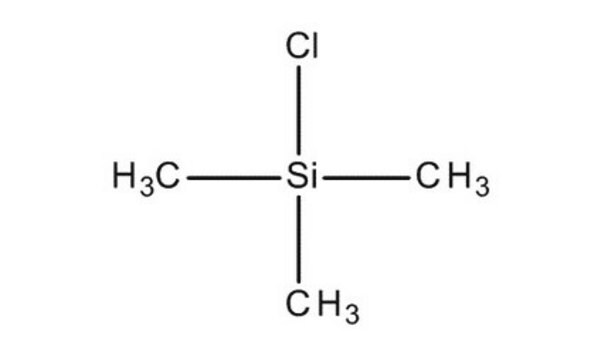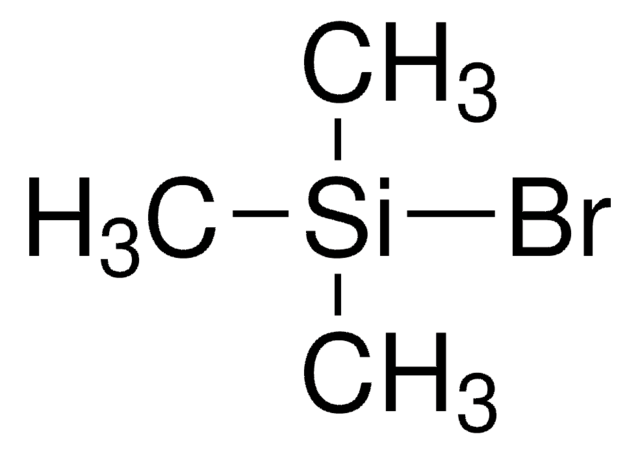386529
Chlorotrimethylsilane
purified by redistillation, ≥99%
Synonym(s):
TMSCl, TMCS, Trimethylchlorosilane, Trimethylsilyl chloride
About This Item
Recommended Products
vapor density
3.7 (vs air)
Quality Level
vapor pressure
100 mmHg ( 25 °C)
assay
≥99%
form
liquid
autoignition temp.
752 °F
purified by
glass distillation
redistillation
expl. lim.
6.4 %
impurities
<0.1% dichlorodimethylsilane
refractive index
n20/D 1.387 (lit.)
bp
57 °C (lit.)
mp
−40 °C (lit.)
density
0.856 g/mL at 25 °C (lit.)
SMILES string
C[Si](C)(C)Cl
InChI
1S/C3H9ClSi/c1-5(2,3)4/h1-3H3
InChI key
IJOOHPMOJXWVHK-UHFFFAOYSA-N
Looking for similar products? Visit Product Comparison Guide
General description
Application
- A reagent to protect alcohol and amine groups via the formation of trimethylsilyl ethers and trimethylsilyl amines.
- A catalyst for the preparation of 1,3-diphenyl-2-propenone derivatives (chalcones) as antimicrobial agents.
- A trapping agent for the anions generated during acyloin condensation reaction.
- A better alternative catalyst to the toxic mercuric chloride for the activation of samarium (Sm) during the cyclopropanation of both allylic and α-allenic alcohols.
- A catalyst in the transesterification of triglycerides with alcohols to form fatty acid alkyl esters.
- A reagent along with lithium bromide for the conversion of alcohols to the corresponding bromides.
- A reagent in Fischer glycosidation.
- A source of acid catalyst in the reductive benzylation reaction using benzaldehyde and Et3SiH.
- A reagent to synthesize sodium trimethylsilanethiolate (Me3SiSNa) by reacting with sodium sulfide, which is an odorless alternative method of synthesizing Me3SiSNa from foul-smelling bis(trimethylsilyl)sulfide and sodium methoxide.
signalword
Danger
Hazard Classifications
Acute Tox. 3 Inhalation - Acute Tox. 3 Oral - Acute Tox. 4 Dermal - Eye Dam. 1 - Flam. Liq. 2 - Skin Corr. 1A
supp_hazards
Storage Class
3 - Flammable liquids
wgk_germany
WGK 1
flash_point_f
-18.4 °F - closed cup
flash_point_c
-28 °C - closed cup
ppe
Faceshields, Gloves, Goggles
Choose from one of the most recent versions:
Already Own This Product?
Find documentation for the products that you have recently purchased in the Document Library.
Customers Also Viewed
Our team of scientists has experience in all areas of research including Life Science, Material Science, Chemical Synthesis, Chromatography, Analytical and many others.
Contact Technical Service















